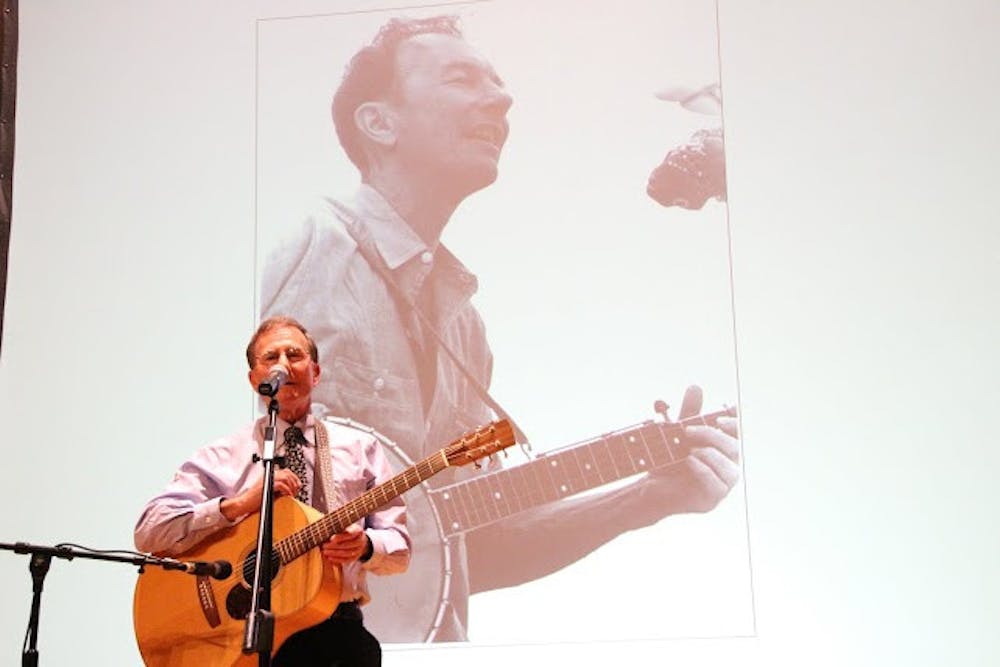By Shannon Kelly
Correspondent
It’s not often that people get to sing and compose music with their favorite musician. But Allan Winkler got just that opportunity with legendary folk singer Pete Seeger, whose musical influence touched not just Winkler, but millions across America throughout its turbulent history.

Winkler spoke first in the beginning of a yearlong series, promoted by the New Jersey Council for the Humanities, focusing on exploring economic justice and political action throughout the world, dedicating his discussion to Pete Seeger and the power of song.
Winkler was young when his mother took him to his first Pete Seeger concert over 50 years ago, but since that day, he has been mesmerized by the singer. Having taken up guitar himself and working toward contacting Seeger, Winkler began a friendship that spanned decades and thrived through rallies, protests and concerts.
Seeger was heavily involved in various movements throughout America, including the Civil Rights Movement, the labor movement and anti-war rallies, connecting people through his songs. Seeger’s focus was not on the songs he wrote, as he also tweaked other musicians’ work for his own use, but on teaching others to sing.
“Folk music is meant to be sung, not listened to,” Winkler said.
Following that, Winkler played verses from a select few of Seeger’s songs to give a sense of what Seeger was like in his time. To describe Seeger’s involvement with the labor movement, Winkler sang a song Seeger wrote in collaboration with Woody Guthrie, “66 Highway Blues,” about men who were oppressed by the cops with nowhere left to go.
Seeger did a stint with the Weavers following his participation in World War II, where the group recorded the song, “Goodnight Irene.”
But after the group was blacklisted from several arenas following their support of Henry Wallace’s Progressive campaign for president in 1948, Seeger went solo. On his own, he found his venue singing at summer camps and schools, creating a generation of adults who grew up listening to folk music. Out of this came the song “Where Have All the Flowers Gone,” a commentary on war about how no more flowers can be found because they all line the gravestones of soldiers.
Soon thereafter, Seeger, learning of the Rosa Parks and the sequential Montgomery Bus Boycott, became concerned with the Civil Rights Movement, whose march anthem, “We Shall Overcome,” Seeger had tweaked from Charles Tindley’s “I Will Overcome.” When black power rose and Seeger felt his efforts were not wholly useful anymore, he turned toward the anti-war campaigns opposing the Vietnam War. Winkler attended a few of those rallies, singing along to “Down by the Riverside” and “Waist Deep in the Big Muddy.”
The latter Winkler referred to as Seeger’s most important song, although Winkler himself found it to contain too many words to bother knowing.
Later on, Seeger once again found a new project: the pollution of the Hudson. Having been born in New York and lived there for most of his life, Seeger felt a particular attachment to cleaning up a river in his hometown. Seeger’s accomplishment in this field was singing up and down the Hudson River in a sailboat christened the Clearwater, playing “Sailing Down My Golden River.”
“I can’t argue that Clearwater changed environmental law in dramatic ways, but Seeger had a hand in creating a consciousness of environmental concern,” Winkler said.
Winkler noted that Seeger’s legacy was his quiet ability to get people to join a cause, sparking intense camaraderie among strangers.
“Pete wrote a whole host of songs that became part of our repertoire,” Winkler said, commenting on how other famous musicians joined with Seeger periodically throughout his time, including Woody Guthrie, Bob Dylan and Bruce Springsteen, the latter of whom made an album of his interpretation of folk music, “We Shall Overcome: the Seeger Sessions,” including several of Seeger’s hits.
Concluding his speech, Winkler sang a few verses of “This Land is Your Land,” to which he encouraged the audience to sing along. Older members of the audience enjoyed listening and singing to the songs they grew up with, while the younger members got a sense of the history of music before their time.







